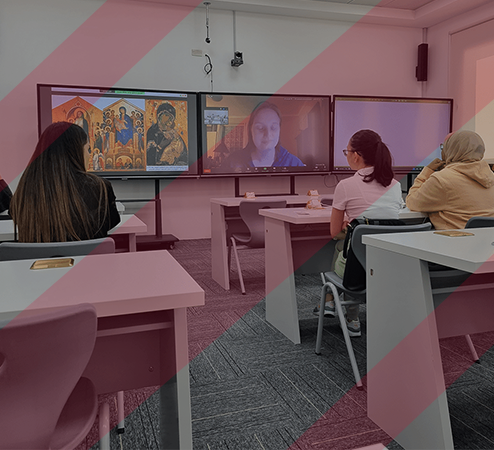Become a Certified Psychology Professional With Our
Psychology
Bachelor of Arts in Psychology Degree Program

Bachelor of Arts in Psychology Degree Program

As one of the top universities in Qatar, we offer a comprehensive psychology curriculum that blends scientific research, practical applications, and real-world experiences. Students will engage in psychological assessments, behavioral studies, and clinical training, preparing them for diverse career paths in counseling, clinical psychology, human resources, and academic research.
The Bachelor of Arts in Psychology is designed for students eager to explore the complexities of human behavior, mental health, and cognitive processes. This program provides a strong foundation in psychological theories, research methods, and applied psychology, equipping students with critical thinking and problem-solving skills essential for careers in mental health, counseling, education, and corporate industries.

Credit Hours: 3
Required course for first semester freshmen. Core content includes transition to college, academic performance skills, problem solving, critical thinking, self management, group building skills, and university policies. Content related to the departmental majors is also included. Fall.
Credit Hours: 3
Study of the important scientific, principles of individual human behavior from biological, cognitive, social, and behavioral perspectives. Fall, Spring.
Credit Hours: 3
Overview of the history of psychology and recent systematic developments. Fall, Spring.
Credit Hours: 3
Introduction to basic statistical techniques and methodology applicable to research problems in the behavioral sciences. Fall, Spring, Summer.
Credit Hours: 3
An introduction to psychological research with emphasis on the critical functions and limitations of both experimental and non-experimental designs, ethics, measurement, and statistical analyses of relevance. Fall, Spring.
Credit Hours: 3
An in-depth consideration of the ethical application of experimental design and methods toward a causal analysis of behavior. Emphasis is on ethical issues directly relevant to control procedures and researcher conduct and bias and developing skills necessary to recognize and utilize the components of experimental design and to interpret and evaluate results. Fall, Spring.
Credit Hours: 3
Introduction to the normal structure and function of the nervous system in relation to behaviors and experiences in humans and nonhumans. Topics include brain structure, physiology, development, drugs of abuse, bodily senses, and behavior. Fall. Special course fees may apply.
Credit Hours: 3
Survey of animal and human research in motivation, including biological drives, intrinsic and extrinsic sources of motivation, emotion, and associated behaviors. Fall.
Credit Hours: 3
Physiological bases of psychological constructs such as memory, reinforcement, attention, sleep, and motivation as each applies to humans and infrahuman species. Spring.
Credit Hours: 3
The study of behavioral adaptation at the level of the individual. Includes empirical and theoretical issues related to classical and instrumental conditioning, complex learning, memory, and the neural bases of learning and memory. Human and infrahuman data are considered. Fall.
Credit Hours: 3
The study of human thinking, emphasizing empirical knowledge on processes involved in information processing, memory, knowledge representation, language, and problem solving. Spring.
Credit Hours: Variable
Individual problems in psychology arranged in consultation with the instructor. Fall, Spring. May be repeated for credit but no more than 6 credit hours between PSY 380V and PSY 385V may be applied toward psychology major requirements.
Credit Hours: 3
An interdisciplinary course designed to promote a critical approach to examining the family and its role in society. Spring.
Credit Hours: 3
An introduction to the basic philosophy, methodology, and methods and principles that underlie the science of behavior analysis in both the experimental and applied domains. Spring.
Credit Hours: 3
Study of the life cycle from prebirth through death including an examination of the major methods, theories, and empirical findings. Fall, Spring.
Credit Hours: 3
An introduction to various psychological disorders, including their diagnostic criteria, risk factors, and characteristics according to the current Diagnostic and Statistical Manual of Mental Disorders. Fall, Spring.
Credit Hours: 3
Principles and patterns of mental, social, emotional, and physical development. Fall.
Credit Hours: 3
The influence of factors including cognition, motivation, perception, learning, emotion, and personality on development during adolescence. Spring.
Credit Hours: 3
Overview of the major areas of social psychology, including social cognition, attitude theory, and intergroup relations, with emphasis on dual process models and implicit processes. Fall, Summer.
Credit Hours: 3
Overview of the major theoretical models of personality formation and expression, including psychodynamic, humanistic, and trait perspectives. Fall.
Credit Hours: 3
An overview of psychology as a science and as a profession encompassing psychological research methods, an exploration of the major and skills required for successful completion, areas of specialization, careers in psychology, and post-graduate opportunities. Fall, Spring. Restricted to psychology majors and minors.
Credit Hours: 3
Issues of how human culture impacts the individuals behavior, attitudes, and mental health. Fall.
Credit Hours: 3
Overview of the principles of learning and their application to instruction, classroom management, and individual differences in learners. Fall, Spring.
Credit Hours: 3
Principles underlying psychological measurement, including reliability, validity, item analysis, test dimensionality, and threats to psychometric quality. Spring, even.
Credit Hours: 3
Provides intensive coverage of contemporary psychological topics. Spring, odd.
10th, 11th, and 12th Grade Transcripts with a GPA of 2.3/4.0.
High School Certificate with a percentage no less than 77-79%.
Proof of English Proficiency (5.5 IELTS or 61 TOEFL or 3.5 iTEP).
Duolingo 110

Discover the limitless possibilities that await you in the ever-evolving landscape of Psychology with one of the prestigious universities in qatar.
Complete the enrollment/application form
Receive a call for an interview with our admissions team
Our Admission Committee will inform the final decision

WhatsApp us
Close
